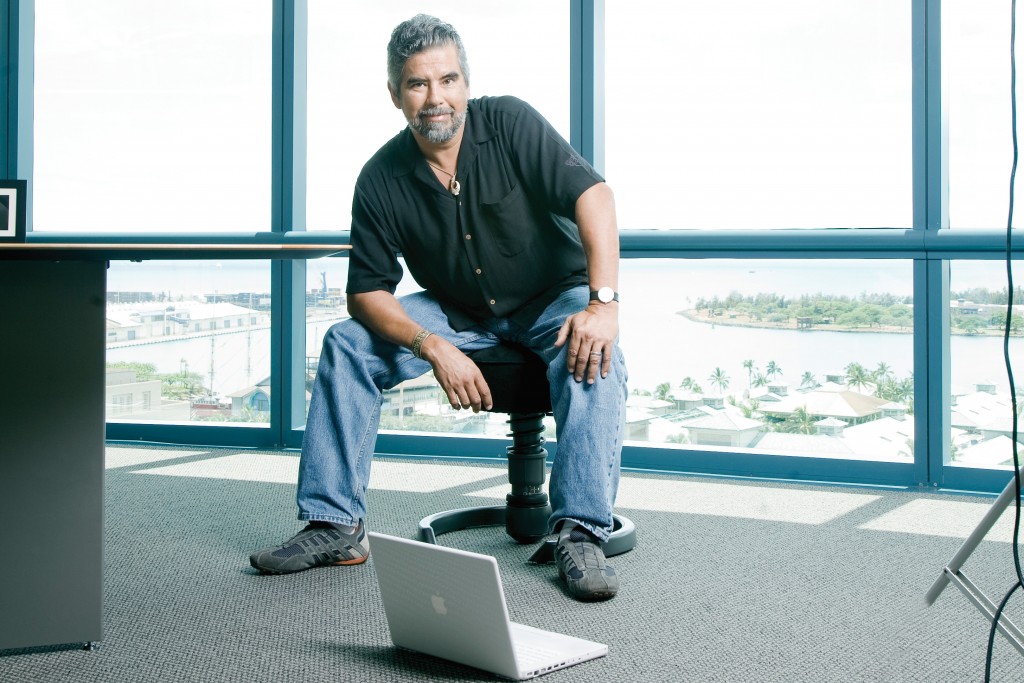Talk Story with Henk Rogers

Henk Rogers is a video game developer and tech mogul who is best known for introducing Tetris to the Western hemisphere. Today, he’s committed to promoting a new concept to the world: renewable energy. In recent years, Rogers has been at the forefront of the developing tech industry in Hawaii. “I’ll fight to the very end,” he says. “The children of Hawaii deserve something better.”
Q: Since this is our Power Issue, what do you think constitutes power?
A: I think power comes from the ability to move people. But it can also be very creepy. Some people with authority get so full of themselves. They become tyrants and some of the things they do are just unbelievable. My definition of real power is when you can change the world in a positive way.
Q: How powerful do you think the tech industry is in Hawaii?
A: Right now, not very powerful. This is an industry where the average salary is probably 30 percent to 40 percent more than the average nontech industry job. So this would be a great industry to have here. I’m really tired of hearing that young people who graduate from college here can’t afford to live in Hawaii. What that means is that they’re moving to the Mainland to get jobs and then we’re getting retirees moving to Hawaii. Is that the future we envision for Hawaii? There’s nothing wrong with that, but, basically, we’re talking about a group that is no longer productive and in the workforce, and then we have a whole support industry, so we still have people who are making beds for a living. I think we all want something better for our children.
Q: Talk of the brain drain is nothing new. What needs to be done to keep local talent in the Islands?
A: As a state, we need to realize that tech is a major future industry. I’m not saying it’s the only industry, but we have to get real on this one. The price of gas isn’t going to go down. (There will be) less and less and (it will get) more and more expensive. I can’t see the tourism industry expanding much beyond what it is now. So if it’s peaked already and if the construction industry has peaked already, then what’s our plan for the future? If it’s not tech, fine, let me know. We need to raise the standard of living of the people. That means better jobs that pay more money. The way I see it, those are tech jobs.
Q: Do you think the tech industry has a serious potential to diversify Hawaii’s economy?
A: Absolutely. We’re at the whim of the world. There are a lot of other places that are beautiful and that are cheaper to get to than where we are, so tourism is very nice, but we can’t depend on it forever. It’s never going to go away, but it’s never going to double in size. And your tourism industry jobs, most of them aren’t that high paying. I see a lot of people in Hawaii, the husband and the wife have to work — and, often times, multiple jobs — just to make a living. I’m not saying that’s bad, but let’s have a good life. If one of those people had a high-tech job, that family would be way better off. The kids could go to private school; young people could afford to buy their own homes — what a concept! There are tons of benefits.
Q: What went wrong with Act 221?
A: First off, Act 221 is what got me to come back to Hawaii. I started two new Act 221 companies, so on a personal level, I’m doing what Act 221 is intended to do. I think there’s a lot of abuse, although I don’t know how much. I think I’ll be OK, but there are a lot of young entrepreneurs that were getting started and all of a sudden they had the rug pulled out from under them. These are tough economic times; money is really tough to come by. As an industry, I think we were too us (tech sector) vs. them (nontech sectors). Basically, the way I think the perspective needs to be is that we are the part of the economy that all of Hawaii would like to see flourish because it’s the one that will give our children higher paying jobs and keep them here in Hawaii. So, if you look at it that way, you wouldn’t shoot that industry.
“So if (tourism has) peaked already and if the construction industry has peaked already, then what’s our plan for the future?”
Q: Should the government have been more supportive of Act 221?
A: I’m having trouble understanding the government. The government on the one hand calls me up and asks me to please show up at the press conference because they want to promote innovation in Hawaii. So I say, “OK, fine.” Well, how are we going to do that? The state is going to have to support these industries. They don’t happen by themselves. But then the state says, “No, we’re not going to do that.” So then, my question is, “What are you going to do?” And they say, “We’ll just have another press conference.” Sorry, but there’s more to it than that. I know there were probably companies who were taking advantage of 221, so close the loopholes. Figure out what those companies did that were wrong and get rid of them. They’re not a benefit to Hawaii, but to kill the tech companies that are actually a new industry and a new future for Hawaii, that’s the wrong way to go about it.
Q: Act 221 helped new tech companies emerge, but what needs to be done to really sustain them long enough to develop a strong tech industry?
A: For one, you can’t take a company that isn’t going to make it and put it on life support hoping that it will. That’s just not the way it is. Last year, there were a lot of companies competing for 221 money. Only the best companies got investment, so there is kind of a survival of the fittest happening. It would’ve been an opportunity to lead if companies in other places were going out of business and the ones in Hawaii survived. That would’ve signaled to the rest of the world that Hawaii is a good place to do business, but instead, it seems like we’re doing our best to say the opposite.
Q: What do you want to be remembered for? What kind of leader do you strive to be?
A: For me, it’s not about my legacy. I don’t care if anybody remembers me. I just want to have made a difference. I want people to think of me as someone who is interested in doing something for mankind rather than for himself. There are leaders who are very powerful around the world and they’re putting millions and billions of dollars away in secret Swiss bank accounts. That is of no interest to me at all. However, not having to struggle for money all the time gives me the freedom to do a lot of the other things that I would really like to do, so I’m blessed in that way.






